#analogies in scripture
Explore tagged Tumblr posts
Text
The Pressing of Olive Oil – The Pressing of Jesus
The Pressing of Olive Oil – The Pressing of Jesus About a year ago I saw an Instagram post by Dave Adamson that brought several analogies to mind and inspired me to do some research and write a post. His post was about Jesus praying in the Garden of Gethsemane and the parallels of an olive press (“Gethsemane”) and Jesus being pressed with the weight of our sin and his sacrifice. As we enter the…

View On WordPress
#analogies in scripture#anoint#anointing#be salt and light#cleaning#cleansed#consecrated as holy#crushed#crushing#garden of gethsemane#gethsemane#healing#high priest#king of kings#kingdom of priests#light#light of the world#olive oil#olive press#pressed#pressing#spiritual food#sustain
7 notes
·
View notes
Photo

He said to his disciples, “The harvest is great, but the workers are few. So pray to the Lord who is in charge of the harvest; ask him to send more workers into his fields.”
Verse of the Day - Matthew 9:37-38 (NLT)
#Bible verses#scripture#words of Christ#Jesus#harvest#witnessing#workers#analogy#pray#fields#Matthew
8 notes
·
View notes
Note
Hang on fuck wait what is up with that design choice, hole in heart vs hole in head?!?!?! I've played so much and never picked up on that!! Great find and def want to hear thoughts on it if you've got some
In reference to a previous post:

has anybody considered the symbolism of gabriel's armor having a huge gaping hole in the chest
hello? can anybody hear me? hole in the head vs hole in the heart?
Ultrakill is a game about holes, and it's opposite, light, which, in turn, is about self actualization, free will, and determination.
Gabriel's heart
Gabriel's heart hole signifies not heartlessness, but rather alienation from his heart.
Ferrymen have lost their purpose and now wander around aimlessly, hoping that the angels would grant them passage into Heaven, despite Gabriel being the only one who cares about their efforts. (from terminal)
The way in which he "cares" is unclear, and could be anything from relaying their prayers to Heaven (Gabriel is a messenger angel in biblical canon, and is the patron saint of communication), to lawyering it up and advocating for them, to just watching sadly and doing nothing. But the fact remains: if Gabriel were complacent with the Council's rule, he would have simply accepted their verdict that they aren't allowed into heaven and thought no more of it. So the fact that he continued to care, indicates that this is a point on which he DISAGREED with the Council. This strongly implies that he was not just a blind stooge of heaven; he had his doubts even before the events of the game. And yet he persisted in acting as their enforcer. This is a crucial part of his arc that I almost never see people get.
(Gabriel also has lots of parallels with the ferrymen with "powerful bodies, trained skills and blind faith" which may have also played a part in his sympathy for them.)
When the Council severs Gabriel from God's light, "a single burning hatred was born anew." He tells V1, "You've taken everything from me, machine. And now all that remains is perfect hatred." But act 2 is literally titled Imperfect Hatred. It's only after losing a second time to V1 that "Gabriel realized he had been mistaken. The strong fire that burned inside him was not hatred at all, but passion." He has been alienated from his heart for so long that he doesn't know what his emotions are when he feels them, directionless except for where the Council points him.
Head holes and anti-holes
God's absence is a huge hole in Ultrakill. Where before there was the radiant light of God there is now nothing. The Council tried to fill this hole, but they merely serve to embody that continued hole. They have no will of their own, merely "[chasing] after the light of God's fire," and you can see this in their design; they are thoughtless.
Unlike the Council, Gabriel's head bears the cross. He truly believed in the righteousness of God and was persuaded to commit heartless acts in his name. I believe he felt some of that dissonance even as he committed such acts but quashed them under scripture.
Compare now the Council's head hole to V1, whose head is a radiant anti-hole. CRAZY implications in that alone.

The light of its creators is gone, but V1 has its own light, its own will, so self driven (by a love of bloodshed and a desire to live) that anyone can see it. Also note that the lights in V1's chest are over its pectorals. If Gabriel's heart hole is squandered compassion, then V1's pec lights are actualized strength.
Liberation by blood
"So this is what you see in bloodshed?" — unused Apostate Gabriel line
Blood in Ultrakill is implied to have transitive properties, granting all who have it sentience and free will, which is why machines all have personalities. And the machines are dependent on blood to live.
Gabriel's defeat in 6-2 and subsequent clarity of purpose is because of blood, and has two biblical analogs.
I've only known the taste of victory. But this taste is...is this my blood? I've never known such relief.
The first one is Eve eating the forbidden fruit. The serpent says, “For God knows that when you eat from it your eyes will be opened, and you will be like God, knowing good and evil.” Original sin is why humans have free will.
Gabriel formerly bore the titles Will of God/God's Will. His song in 6-2 is Death of God's Will. And from intermission 2:
"He drew his blade and held it in contrast with the dying light. In its reflection, he saw a weapon reborn, no longer wielded by the will of another, but his own."
The second analog is holy communion. Bood drinking is a sacrament in Catholicism; it is through eating the body and drinking the blood of Christ that one strengthens their bond and achieves unity with him. But Gabriel is tasting his own blood. His communion is unity of heart and mind. It's only then that he's able to correctly identify what he is feeling.
Gabriel had never before known the joy of a struggle, of coming face-to-face with an opponent of equal or greater measure. Though he had lost twice, each loss only further grew his desire to overcome.
Up until now, he had only done what was expected of him, but now for the first time he had found something he himself wanted. Not even the fast encroaching End of Hell mattered to him anymore.
He wants to beat V1, not for the threat to hell it poses, not for the council, not to regain God's light, but because he wants to.
This communion also allows him to properly consider the doubts he had about the Council that he had previously suppressed.
Having come to realize the horrors he had committed in God's name, he felt a great guilt. Though he could not undo what he had done, Gabriel knew he had to make things right.
When Gabriel frees heaven from the Council's tyranny, he communicates this through blood, and very publicly. Everyone must see the blood, that they are free now.
Radiance
There are many ways God is connected to fire. The song that plays at each secret terminal is "The Fire Is Gone". The Council "chases the light of God's fire." His light is the angels' life force and is described as "embers". Compare this to the language used to describe Gabriel's passion: "a single burning hatred" and "the strong fire that burned inside him". God's light may be almost gone, but Gabriel has his own fire, his own light now. You can see it reflected in his wings and halo, the way they glow radiant gold against blue, not unlike V1.

Sisyphus' terminal entry:
Sisyphus' charisma and drive had made his warriors dependent on his radiance and guidance. Although he did not know why yet, Gabriel recognised this flaw, having experienced it first hand, and ordered a focused assault to take down the king.
Even before the game, Gabriel knew you could not rely on someone else's light! Presumably, he saw it in the losing side during the war in Heaven, but there is the possibility that he experienced it himself. Either way, this would have been one of the things that contributed to his growing disillusionment with the Council's rule, even if he couldn't place exactly why.
Minos' terminal entry:
As manifestations of pure will, souls are incredibly powerful, to the point that even the prideful angels see them as a threat and will use any means necessary to stop them from forming.
As Minos' will was strong enough to attempt to stand up to Heaven's rule, the angels chose to imprison his soul in an attempt to stop it from forming into a prime soul.
The fact that Gabriel not only stood up to the Council, but killed them all, means that he has a will greater than Minos. When his vessel dies, whether by the fading of God's light or one final defeat by V1, he may become a prime soul.
Minos and Sisyphus
Hole vs radiance. Their layers are night and day.
The way they failed to free their respective layers.
The king, rather than fight back, tried to reason with him, but Gabriel mercilessly struck him down without listening.
Sisyphus' time had finally come, and once the angels returned, they were met with a force and fury that had boiled in the hearts of men for millennia, a warcry so fierce it shook the very foundations of Hell.
Their feelings about their defeat to Gabriel.
From the prison inside his own body, Minos helplessly watched as his soulless corpse, now controlled by parasites, tore apart everything he had worked so hard to build, cursing his own weakness for failing to protect his people.
To him, fighting an impossible battle with full knowledge of its futility and taking joy in just the act of resistance itself is the ultimate rebellion against the oppressor.
(Compare also Apostate Gabriel's "joy of a struggle" vs Sisyphus "taking joy in just the act of resistance." One must imagine Gabriel happy.)
Their feelings about their defeat to V1.
Forgive me my children for I have failed to bring you salvation from this cold, dark world.
Ahh...So concludes the life and times of King Sisyphus. A fitting end to an existence defined by futile struggle, doomed from the very start...And I don't regret a SECOND of it!
Think about it.
#ultrakill#gabriel ultrakill#ultrakill meta#HOLE THEORY WINS AGAIN#hole theory#i will never stop talking about holes
283 notes
·
View notes
Note
what are sunnis and salafists? sorry that this out of nowhere im a white anon so i dont know alot and you can ignore this if you want
Sunnis are adherents of Ahlul Sunnah wal Jumu'ah (the people of the Sunnah) or the Sunni branch of Islam. It constitutes the majority of followers of Islam, with Shi'as being the second largest group of Muslims. The name is derived from the term Sunnah, which means Prophetic traditions and practices.
Historically, Sunni Islam did not originate at the onset of Islam and following the historical disagreement regarding the successorship of Muhammed (pbuh&hf), but is rather the culmination and consensus of centuries of legal and scholarly opinions, debate and theological studies, thus is it is a misconception to assume that Sunnism was brought about during the political schism in the early years of Islam, whereas Shi'ism were a partisan group before forming its own theology and jurisprudence a century later. Sunni Islam derives its laws and jurisprudence through the Qur'an, Sunnah, consensus and analogical reasoning. Sunni Islam is represented by four school of thoughts: the Hanbali school, the Hanafi school, the Maliki school and the Shafi'i school. Each school of though represents a particular geographic location, and lay people following Sunnism may follow the scholarly opinion corresponding to their geographic origin and location. Most Sunnis follow the Maturidi and Ashari rationalist schools of theology and rely on scriptural sources to derive their understanding regarding God's nature and the material and metaphysical reality.
Salafism is a reformist/revivalist movement within Sunni Islam that holds that the purest form of Islam can only be derived through the opinions and practices of the honorable ancestors (Salaf al-Saleh). They hold that the best generation of Muslims were the Sahabas (companions), the Tab'iun (the second generation) and the Taba al-tab'iun (The third generation), according to a prophetic tradition, viewing later interpretations of Islam as innovations or deviation from the Qur'an and the Sunnah. They believe that only through the Salafs can absolute monotheism be understood and that anyone who rejects them or derive different opinions are deviants or heretics, such as the Shi'as (and some Sunnis), who venerate saints. They reject the concept of Taqlid (emulating), that is, following the four schools of thought, holding that ijtihad (independent reasoning) takes precedence over Taqlid through the study of the Qur'an, the Sunnah and consensus of the Salaf al Saleheen. Salafists tend to reject the rationalist schools of mainstream Sunni theology and adheres to a literalist and traditionalist (Athari) interpretation of Islamic theology as understood from classical scholars such as Ibn Taymiyyah, Ibn Kathir and Ibn Qayyim. They may also derive their understanding of religion through the legal opinions of other modern Salafist scholars. There are several Salafist movements, such as Madkhalism (the quietist school), Wahhabism, Salafi-Jihadism, Ahlul al-Hadith and etc. Salafists are known for their puritanical view on Islamic monotheism and literalist interpretation of scripture, hence their intolerance toward other co-religionists that do not conform to their religious interpretations. They most notably hate Shi'a Muslims.
116 notes
·
View notes
Text
Its been six years and we all know this but the writing on Terror is so tight I can never get over it. Take one line: "It is no accident the world was reborn clean out of an ark" and think of all the the things it tells us about Irving, how he understands the world and how he understands himself. Not just "this guy is religious" but that he understands their situation to be analogous to one of the more dire acts of God, the total destruction of all life on earth as punishment for humanity's transgressions. But clearly, since he's on the ark, he must be one of he elect. An ominous fin parts the water and the many-toothed maw of Calvin breaches the surface, then disappears back to the depths. But of course one can never be sure of one's own righteousness, guarding always against vanity, so total withdrawal from the wicked world and constant internal surveillance of one's own nature is a must.
Because of course if someone volunteers that they think it good to be separated from the temptations of the world, even under such dire circumstances, we start wonder what those temptations are-- what's keeping you from getting a seat on the ark?
It also distinguishes him from the expedition's other vocal evangelical, Sir John. Think of the difference between angels soaring overhead, the invisible world of light etc, and the scouring violence of the flood to make the world clean. The difference between "God loves you :)" and "God will take a brillo pad to your sinful flesh...because he loves you".
And if we wanted to stretch this bad boy beyond the bounds of reasonable inference (my favorite) we could place him among early 19th century scriptural geologist types who are using the tools of the Enlightenment to try and walk back any philosophical gains by proving that the Biblical flood was a real and literal occurrence that left worldwide evidence. This isn't a story he's telling himself, its the physical observable reality of the world. It's carved in the rock. And yet, when someone implies that they don't believe, its catastrophic. You're not supposed to think about it too hard. You're not allowed.
He's trying to share this very personal, foundational, soul-deep belief that suffering is good because its part of the plan, whether it be in obeying orders that dont make sense (build the ark while bystanders call you a fool) or enduring extreme conditions (forty days of rain while everyone you know drowns) or the day to day ordeal of wrestling with one's own depravity. It can be joyful! Its good to be chosen! There's a rainbow promise coming at the end! Singing is fun! And Hickey looks at him like he's out of his mind and that's when the shouting starts.
The entire scene is what, less that three minutes? But I could mine it for days. Hats off
#the terror#youll eat your vegetables (contstant jirvposting) and you will like it#i get it now i get why people flip out over representation#neurotic just like me!!#john irving#yeah there is really nothing going on at work why do you ask?
145 notes
·
View notes
Text
I wanted to share something I’ve been thinking about regarding how readers on blogs (like mine or others') tend to approach questions and answers. This was set in motion by an anonymous message I received recently that made me giggle a bit, especially because it reminded me of how much we, as random bloggers, talk about the dynamic between questions, answers, and how people interact with these platforms.
It seems like many readers have grown used to essay-length answers to even the simplest or most repetitive questions. Some of these questions have been answered countless times already or could be answered by the readers themselves if they just paused for a moment, turned inward, and truly reflected. But instead, people often immediately jump to sending a message, hoping for a long, detailed response that will “click” for them, as if the answer lies in the length or complexity of the words.
This expectation comes from the way some communities—or even other bloggers—approach things, offering long-winded posts full of explanations, metaphors, emojis, and a kind of conversational fluff that feels comforting. Readers have come to associate detailed responses with care and shorter, direct answers with coldness or rudeness. But the truth is, it’s quite the opposite. A simple, to-the-point reply isn’t dismissive; it’s actually a sign that the answer itself doesn’t require overcomplication.
Here’s the real problem: many readers have started to treat blogs and posts as safety nets or holy scriptures, thinking they can’t make progress without them. That's why whenever someone deactivates or deletes their posts, chaos starts. It’s as if they believe there’s one magical post or response that will finally make everything click. But that post doesn’t exist. No one ever truly “gets it” from reading a post, no matter how detailed or well-written it is. Clarity doesn’t come from reading—it comes from you.
For instance, many bloggers didn’t have endless posts to rely on back when they saw what they saw. We, for example, didn't learn about it on tumblr at all. There weren’t thousands of essays, analogies, or explanations to read through. It was minimal, simple. And that simplicity forced them to look inward, instead of relying on an external source for validation or understanding. Nowadays, people spend hours scrolling through posts, consuming every blog as if they’re going to miss out on the one post that holds the key. But they’re not missing anything.
The more you read, the more complicated it gets. You don’t need 800 posts, 20 asks a day, or three years of scrolling through Tumblr to realize what’s being pointed to. In fact, the opposite is true—you need less. Less reading, less asking, less overthinking. Stop for a moment and ask yourself: is this endless searching actually helping you? Is it getting you anywhere?
Many readers don’t want to hear this because it challenges the habits and attachments they’ve built. But those habits—the constant searching, questioning, and relying on external answers—are what keep you in the same loop. The more you treat blogs and posts as your safety net, the further you drift from the simplicity of what’s being pointed to.
So here’s the blunt truth: the only place clarity starts, goes, and ends is within you. Not in a post, not in a blogger, not in an answer.
If this feels frustrating or even offensive to hear, take a moment to sit with that feeling. That frustration or discomfort might just be a sign that it’s time to stop consuming and start being.
You cannot explain the inexplainable with more words. It's useless in every sense.
55 notes
·
View notes
Text
On Fighting Nothing - Ultimate Dirk in the Struggle Against The End of Homestuck
[ Edited Excerpt from Through Loving Eyes--Who Is(n't) Dirk Strider?]
You and I have been through this, have been through that, have been at ease. Nothing scares me more than God, and Nothing cannot sustain.
Let's consider this verse from the Homestuck: Beyond Canon album song, The Leaving, as it might relate to the Epilogue's Ultimate Dirk Strider and the nature of his character arc.
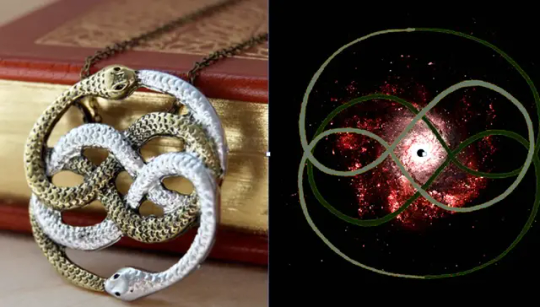
It’s a well known fact from the days of Bladekindeyewear (who’s back and occasionally liveblogging HS² on Tumblr, if you’re interested) that The Neverending Story is a major source of thematic inspiration for Homestuck, with the twin ouroboros symbol from the movie appearing in several places in the comic connected to Cherub lore, including their mating rituals, which are said to tap into the innermost essences of Paradox Space.
If you don’t remember the Neverending Story, its a book/movie about the magic realm of Fantastica, an infinite realm of fantasy and wonder living inside an in-fiction book also named the Neverending Story, which is experienced by all who read it. Our protagonist Bastian reads the book, and inside lives a story where the protagonist Atreyu is sent on a quest to try to overcome the threat of the mysterious force called the Nothing, which is bent on consuming the entire fictional world.
The Nothing of the Leaving, then, is a literary reference. What scares Dirk more than God is not “nothing” in the sense that he’s unafraid of God, but instead the specific darkness of non-existence that overtakes the realm of Fantastica, obliterating it completely, reducing it so utterly that there’s not even dust left behind.
And what turns out to be the source of the Nothing in the Neverending Story?
The inevitable apocalypse that comes for all stories: The thump of the cover as you turn the last page. The moment when a living narrative passes from the reader’s experience and turns into an immediately fading memory. Whether it happens quickly or slowly, everyone who’s loved any story eventually moves on.

And that is precisely the armageddon that has struck Earth C at the beginning of the Epilogues. Seven years out from the end of the comic, it is a world almost entirely forgotten, populated by people that we almost don’t even recognize as the characters we loved.

Dirk and his friends struggled through the entire labyrinthine nightmare that is the plot of the webcomic Homestuck to reach their happy ending, and almost as soon as they got there, nearly the entire community of readers that shared the journey with them abandoned them and moved on.
One world burned up in fire (Beta Earth). One world silenced by psychic death scream (Alternia). One world drowned and boiled under water (Alpha Earth). And now? A fourth world, Earth C, doomed to death by simply being forgotten, extinguished in its cradle because it wasn’t loved enough. Gone not with a bang, but with a whisper.
That is the nature of Homestuck’s fourth and (so far) final apocalypse.
youtube
And striving against that fate, watching all of their friends and loved ones succumb to the dark like a beloved horse…we have Rose Lalonde and Dirk Strider. Our platonic (in the literal sense) Adam and Eve at the end of the world. So what else is there for them to do, except to bite the apple?
To Ascend, though it is terrible.
THE LION EATING THE SUN — THE FLAME OF SCORPIO


The only way to fight against Darkness is to Light it with a torch, and the ultimate torch is the Sun. Yaldabaoth, the denizen with the symbol of Light placed upon its head, is also the denizen shared by Caliborn and Dirk. Mythologically, Yaldabaoth is a satanic Demiurge or creator God, analogous to the God of Biblical scripture but either flawed or evil, depending on who’s talking about him.
Caliborn, who goes on to dominate the plot of Homestuck to the point of being responsible for the existence of the Alpha Timeline, and thus the plot of Homestuck itself, is decidedly the evil variety of Demiurge, ruling over the rest of the cast of Homestuck through brutality and death and reveling in every drop of the blood he spills.
And let’s make no mistake: Dirk, already consumed by the process of ascending to Ultimate Self, carries with him the risk of advancing and carrying on Caliborn’s legacy.
Lord English, Doc Scratch, the Soul-infested version of Lil Cal — all three of these entities carry Dirk’s Soul inside them, and so they can potentially count as splinters. And all three excel at manipulating and controlling unaware parties into carrying out their goals, such as Lil Cal corrupting Bro’s training of Dave, or Doc Scratch exploiting and weaponizing Vriska.
In the roiling oceans of Dirk’s ultimate self, how can we really tell who is the puppet and who is the puppeteer? We can’t. But we can tell that so far, Ultimate Dirk doesn’t exactly operate the way Caliborn did. Like the Demiurge in Timaeus’ Testimony, he insists on at least a veneer of nobility, even if he’s flawed or imperfect at it, claiming he’s only doing what needs to be done. And notably, Dirk doesn’t physically hurt a single person throughout the Epilogues.

It’s under this logic that he chooses to take on the role of antagonist, deliberately raising the stakes of his reality high enough to kick the story of Homestuck back into motion. He does this while actively knowing he’s signing up to be executed, preferably by Dave in his opinion, but certainly by someone else otherwise — Kanaya being another likely contender.
Either way, it makes the entire antagonistic enterprise one long suicide attempt on his part. Dirk may not have given up on Homestuck’s future, but in deciding to be willing to fight for it, he has given up on his own life.
youtube
It is, in essence if not intentionally, the bargain of the Flame Of Scorpio.
“The Scorpion killed other bugs and ate them. Then one day, the weasel found him. The scorpion fled, and fell into a deep well. He thought to himself: ‘How long have I eaten other creatures? And yet, the one time that I was the prey, I fled in utter terror. And look what came of that. I’ll die in this well, alone. I could have given the weasel another day of life with my sacrifice. But now my death will help no one. I’m useless. Dear Lord, I beg of you, look into my Heart and hear my prayer. In my next life, don’t let me waste myself. Let me use my body for the true happiness of everyone in the world. And then the scorpion burst into flame. A brilliant crimson glow. And by the light of his burning body, he lit up the night forever.’
— Night on the Galactic Railroad
It’s a covenant with God, a kind of magic whereby a scorpion — an entity that hurts and consumes by its nature, a Natural Antagonist, if you will — sacrifices itself to light up the night sky. A sacrifice that is depicted in 2011’s Mawaru Penguindrum’s homage to Night on the Galactic Railroad beautifully succintly with the act of…

Tearing one's heart out.
You sent me FIRE. FIRE, I’ll tear my throat out. Burn my blackened lips. You gave me FIRE!
Fire, I’ll tear my Heart out. I’d rather tear my Heart out... But I can’t stay here! --The Leaving, Homestuck Beyond Canon

If this seems familiar conceptually, it might be because it's a very similar logic to the one adopted by Vriska Serket in the original Homestuck comic, who adamantly believed that since she’s taken so many lives, she can only justify her existence by Rising Up and defeating Lord English for the benefit of everyone in Homestuck.
Vriska throws herself into the role of Hero/Protagonist, while Dirk throws himself into the role of Villain/Antagonist, but they do so with the same kind of fanatic quasi-religious zeal: That by embracing their own sharper features and committing to sacrificing for the greater good, they can make things better for everybody else.

And so Dirk commits his biggest and most obvious gesture of antagonism: He kidnaps Rose Lalonde, taking her with him on his journey to start a new session. In the process he moves her soul into a (frankly sickass) robot that he claims can withstand the infinite processing power necessary to hold her Ultimate Self, which her physical body can’t sustain.
While whether or not that’s true remains to be seen, this move has been deemed highly unpopular by the fandom, to say the least. Yet there’s a logic to why he had to do it. If Dirk had said fuck it, taken his ball and fucked off the planet on his own, what would’ve happened?
His friends and the fandom would’ve collectively gone “Weird move, but go off I guess?” and collectively moved on without a second thought. Dirk simply doesn’t carry the emotional weight to carry an entire narrative with the question of whether or not he gets a happy ending. He just has the sort of personality that inclines us to go “Probably not, but oh well. Sort of the dude’s own fault anyway.”
But Rose? Everybody loves Rose. Everybody fucking loves Rosemary! There’s nothing the Homestuck fandom wants more in the world than for those two girls to be happy together. If Rose isn’t okay, we’re not okay, and that’s exactly what Dirk needs: Something to be so wrong in the world that we can’t help but keep watching, in the hopes that eventually, someday, it will be set right again.
Rose is the very Sun Dirk has stolen in the process of making a Narrator-Demiurge of himself. She is the guiding Star that leads to the future, the very Light of Homestuck.
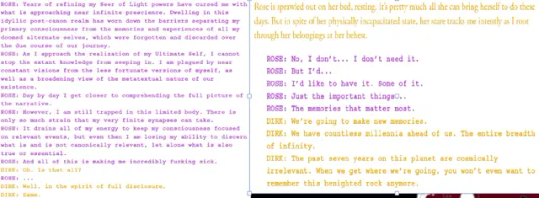

And look, Dirk gets a lot of flack for the whole Rose-snatching thing, but let’s put something into perspective here. In the epilogues, Rose is dying, or suffering so much she may as well be dying. Dirk may or may not be exploiting or undermining Rose’s agency, but his Rosebot innovation for her does end her immediate excruciating pain.

Ultimately, Rosebot agrees with Dirk about taking this course of action, deliberately thanking him for taking her with him and expressing her own feelings on the importance of their cause before Dirk succumbs to his temptation to eke out a hollow victory over his loneliness by using his narrative powers to encourage her eagerness.
While there are secrets being kept and the power dynamic is unbalanced, Dirk and Rose are not abuser and victim in this venture — they are co-conspirators. Remember that Rose, too, has a role to play.
If Dirk is the dragon, the damnable villain, then she is the princess in the tower, the damsel in distress. It’s in both of their mutual interests for her to play to an attitude of relative innocence and ignorance for the audience’s benefit.
The better to keep us watching.
#homestuck#dirk strider#rose lalonde#Homestuck: Beyond Canon#Homestuck^2#The Homestuck Epilogues#Vriska Serket
80 notes
·
View notes
Text
i finished reading 'the widening of God's mercy' by richard b. hays and his son, which for anyone unfamiliar is basically by a guy who used to be non-affirming but changed his mind and thinks the trajectory of the Bible shows God's gradually expansive mercy towards the excluded (gentiles, eunuchs, women etc) that is analogous to lgbt inclusion today.
it's an interesting take that gets away from the grind of just beating away clobber passages, and i think it's a valuable resource in the repertoire of works that try to articulate positive reasons why lgbt affirmation is consistent w the Christian story. but i think one of the most baffling parts is the way the book flirts with the idea of God changing his mind without fully committing.
i dont think you need to appeal at all to some kind of idea of God changing his mind to make the point the book is making; that the overall trajectory/arc of the Bible is towards inclusion, overruling laws/interpretations of laws that undermine human flourishing, and re-examining what we take to be the Word of God.
and at no point does the book take this suggestion that God changes his mind to the obvious conclusion that God used to think gay people should be stoned and will be excluded from heaven, but now has actively repudiated the clobber verses. in fact it's decidedly uninterested in them in any way.
but it flirts with the idea enough to feel unsatisfyingly un-thought-through to me (and probably downright heretical to a potential evangelical it's trying to sway). and i suspect it's because the authors are very much biblical scholars rather than theologians, because the book could definitely use with a good dose of theology. the book acknowledges there are narratives in the Bible where God is depicted as changing his mind, and then sort of just suggests that well, we've inherited lots of theological bias against God changing his mind but if we read the Bible it's clear and obvious that he does that.
but i'm not sure the authors actually believe this is true of God as an entity we worship and interact with, because at other times they write in ways as if God's will was always a certain way and just revealed piecemeal, or distorted by culture, or deliberately responds to human action. i don't think, for instance, that the authors believe God was ever genuinely homophobic, but rather that they're trying to maintain a certain dynamic freedom in God; God is free to act as he wants and we should not feel trapped by our interpretation of scripture into straining a gnat and swallowing a camel.
but i feel like casually dropping the idea of God as changing his mind is like dropping a nuke on america to kill a single cockroach. it raises huge questions that the book doesn't seem interested in answering, or even acknowledging the significance of. does this mean God genuinely was homophobic and thought homosexuals should be executed? how did God learn not to be homophobic? is true morality then some kind of standard superior to God that exists beyond him? have we stumbled our way back into the Euthyphro dilemma just to advocate for lgbt inclusion?
i know process theology etc exists and is well thought out (even if i vehemently disagree with it), but i dont even know if this book is trying to advocate process theology. i dont even have a problem with using language about God changing his mind - it's biblical, and inasmuch as we understand all language about God having emotions etc is analogical it makes sense of the way God seems to act towards us. but the book seems like it's happy to suggest radical ruptures in the way we view God to achieve rhetorical victories when it's not even unnecessary. it just feels distracting.
and i wonder if it almost comes from a place of being so evangelical you veer into being more radical than a lot of outright progressive christians. like, i would just happily say large chunks of the Bible reflect developing theology about God and divine inspiration intermingled with human brokenness. it's a complex work of narrative with layers not a simple didactic instructional text. and so when i think the genocide narrative in Joshua is not reflective of who God is I don't feel a need to suggest maybe God has changed his mind, but rather than people's understanding of God changed.
and i think perhaps the authors (who admittedly i dont know a ton about) still have a sense of needing to respect inerrancy (or at least, appear that way for their target audience, because there are hints in the text of a deeper understanding of historical critical scholarship etc) that rather than interpret scripture metaphorically on the topic, theyd take it so literally they introduce something that is unequivocally more 'heretical' than just rejecting inerrancy.
i have seen a few times this attitude of 'well, if we read the Bible again, we see clearly that God gets angry, changes his mind, is not omniscient etc, so why did we allow all this greek philosophical baggage of immutability etc to infect christianity?'. and i can respect that position when properly developed, but i feel as if it often comes from an overly reductive sense of sola scriptura that ignores the fact these philosophical ideas are trying to make sense of the very concept of God through reason.
and even if not everybody needs to know that philosophical undergirding, it's important that it exists within the christian tradition; a concept of God that is just based on bible stories with no further reflection or thought is going to be shallow. it's like if science stopped at 'when we drop things they fall down' and was decidedly uninterested in developing a theory of gravity
similarly w the trinity; you're not going to get it from just a straightforward reading of the bible. but it is a very effective framework for making sense of scripture. it gives the confusing and seemingly contradictory perspectives on God in the Bible a coherency that is necessary for Christianity to be a coherent theology.
and so i guess approaches to faith that are just like 'let's just follow what the Bible says' miss the fact that theology/philosophy arent just bolted on to make Christianity more respectable, but just inevitably what develops from deeper reflection on the faith. and rejecting that is like saying 'we dont need case law or precedent; we just need to follow the constitution to the letter'.
anyway ive gotten a bit sidetracked on my rant. overall, book with a good overall point that is undermined by flirting with ideas about God that are severely under-served by just casually throwing them in to defend gay marriage
#christianity#christian#queer christian#gay christian#religion#theology#the bible#progressive christian
32 notes
·
View notes
Text

“The Way is not in the sky; the Way is in the heart.” ― Gautama Buddha Dharmachakra Talon Abraxas
Dhammacakkappavattana Sutta - Turning of The Wheel of Dharma
Imagine, the first turning of a great wheel, initiating a motion that changes the course of history. The Dhammacakkappavattana Sutta is precisely this for Buddhism. Translated as "The Setting in Motion of the Wheel of Dharma", it's the pivotal juncture where Lord Buddha sets the spiritual journey into motion for all.
This sutta was the First Sermon given by Lord Buddha, in the Deer Park at Sarnath and the core focus of this sutta are the Four Noble Truths. Here, The Buddha, soon after His enlightenment, meets His first five disciples and The Master of all masters unveils a transformative tale before an eager audience.
Nestled within the vast tapestry of the Samyutta Nikaya scripture, this sutta is akin to a gemstone at the heart of a royal crown. The Nikayas are ancient repositories, or collections, of Lord Buddha’s discourses. In this vast ocean, the Dhammacakkappavattana Sutta shines like the North Star, guiding seekers on their path.
In the sutta, Lord Buddha presents the Middle Way, an analogy as striking as a bridge connecting two shores. Instead of extreme asceticism or indulgence, The Buddha speaks of this balanced path as the means to enlightenment.
The core of this sutta, and arguably the cornerstone of Buddhism, are the Four Noble Truths. These can be thought of as four signposts on a journey, each highlighting a particular aspect of existence. Suffering, its origin, its cessation, and the path leading to its cessation – these truths are akin to the compass directions guiding our journey through life.
What's revolutionary about this sutta is not just its content, but its timing. It’s The Buddha's first discourse post-enlightenment. Like the inaugural song of a bird signalling dawn; this sutta is that song for the Buddhist tradition.
The Dhammacakkappavattana Sutta is not just a philosophical treatise; it's a call to practice, an invitation. Like a master architect revealing the blueprint of a magnificent palace, Lord Buddha lays out the path for building a life free from suffering.
In essence, this sutta captures The Buddha’s foundational teachings, like a seed containing the DNA of a mighty tree. Rooted in ancient wisdom and branching out to touch countless lives, the discourse sets in motion a wheel of transformation that continues to revolve even today. -Buddha Beings
33 notes
·
View notes
Text
other words for,
happy
joyous, delighted, ecstatic, cheerful, elated, glad, gleeful, jolly, merry, thrilled, upbeat, overjoyed, jubilant
sad
upset, depressed, melancholy, mournful, somber, sorrowful, pessimistic, sorry, unhappy, blue
angry
fuming, raging, irritated, annoyed, bitter, enraged, irate, furious
scared
fearful, afraid, anxious, panicked, panicky, startled, petrified, shaken, terrified
bored
disintegrated, fatigued, tired
big
fat, full, gigantic, massive, enormous, tremendous, colossal, considerable, hefty, huge, sizable, substantial, full, immense
small
cramped, limited, meager, microscopic, miniature, minuscule, modest, narrow, small-scale, young, paltry, poor
pretty
attractive, beautiful, charming, cute, elegant, good-looking, graceful, handsome, lovely, neat, pleasant
ugly
repulsive, unattractive, hideous, grotesque, grisly, unseemly, unsightly, horrid, awful
dislike
displeasure, disapprove, aversion, disgust, loathing, hatred, enmity
like
approve, adore, admire, cherish, appreciate, love, dig, fancy, prize
easy
effortless, obvious, simple, painless, straightforward, smooth, child’s play, light, basic
hard
difficult, tough, troublesome, complicated, serious, heavy, rough, arduous, backbreaking
soft
velvety, silky, smooth, spongy, fluffy, elastic, mushy, delicate, comfy, creamy, pliable
rough
rocky, rugged, harsh, coarse, choppy, chapped
hot
blazing, boiling, heated, searing, sweltering, warm, scorching, sizzling
cold
chilly, freezing, icy, brisk, frigid, cool, wintry, frosty
thick
dense, fat, chunky, broad, wide, massive, hard
thin
skinny, slim, small, slender, gaunt, lean, fragile, delicate, narrow, meager
agree
concede, comply, allow, concur, grant, settle, sign, set, recognize
disagree
clash, oppose, divide, feud, haggle, object, oppose, quarrel, quibble, dissent, bicker, contend
nice
kind, cordial, fair, friendly, good, lovely, swell
mean
rude, callous, dangerous, evil, malicious, nasty, vile, ugly, hard, vicious
loud
big, boisterous, deafening, resounding, roaring, ringing, raucous, rambunctious, intense
quiet
muted, hushed, muffled, low, soft, reticent, noiseless
firm
stiff, thick, tough, unyielding, sturdy, solid, hard, substantial, rigid
loose
baggy, lax, relaxed, sloppy, slack, limp
delicious
appetizing, delectable, delightful, exquisite, heavenly, enjoyable, pleasant, savory
distasteful
unpalatable, unappealing, unappetizing, unsavory, indigestible, inedible, savorless, nasty
woman, girl
female, lady, madam, beauty
man, boy
male, gentleman, dude
home
house, shelter, dwelling, residence, mansion, apartment, shack, box, condo, building
like, similar
alike, akin, analogous, allied, parallel, matching, equivalent, comparable, identical, related
music
soul, tune, opera, melody, piece, singing, chamber, measure, hymn, song
art
design, painting, illustration
and writing
article, book, piece, scripture, manuscript, story, passage, novel, reading, work
all synonyms found on www.thesaurus.com
#writeblr#writers and poets#writing#writer#creative writing#writers#writers on tumblr#writerscommunity#writing help#writing tools#vocabulary#applepiealopecoid
26 notes
·
View notes
Text
Touching upon the dangers of ‘manifestation’ and how hard work honours God
It’s common in new age spirituality nowadays to ‘manifest’ things or that you can make whatever you want happen no matter what. This is wrong. Who are we to be able to do such great things? It is true that thoughts can dictate mood (if we look at things in a positive light taking into consideration what the Lord is telling us then you will feel happier as a result and be then perceive more opportunities opening for you; contrastingly if you think pessimistically you will overlook and miss the countless blessings God has given and forgone certain opportunities). Scripture calls us to trust in God and put in the effort he has equipped us with.
For example, consider you’re a student taking a test which you’ve had adequate time to prepare for. If you did not study at all and then the night before the exam pray to God, ‘help me to get a high mark’, how will that happen? God himself cannot write the exam for you. Contrastingly, a student who does prepare can receive God’s peace and guidance during the exam. Now, of course because of Jesus we are not saved by works but by His grace. However, the point I want to make with the test analogy is that you can pray and pray and pray for success but if you are not putting yourself out of your comfort zone or using all your available resources then how will you become the person God created you to become?
As my great-grandmother would say “luck follows those who work hard”. Every good gift comes from God. It doesn’t mean we can stay in our room do nothing but scroll on tik tok and then expect Him to bring us career success, love snd friendship to our door. God blesses the steps we take in faith:
“And whatever you do, do it heartily, as to the Lord and not to men,”
Colossians 3:23 NKJV
It is easy to be bombarded when new age spirituality all over social media. However we are reminded that it is God who directs our plans. If you consider how the very number of hairs on our head is numbered and how greatly loved we are by our Heavenly Father then you will relax and learn to trust in his plan.
God-bless
#christian quotes#christian bible#bible verse#belief in jesus#jesus loves you#christian faith#christianity#faith in jesus#jesus christ#christian blog#christian living#jesussaves#manifesation#godly life#god is kind#god is my refuge#bible study#prayer book
35 notes
·
View notes
Text
Incomplete vs. overshoot
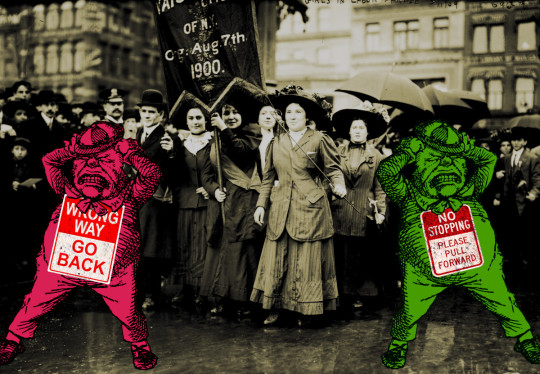
I'm on tour with my new novel The Bezzle! Catch me TONIGHT in Seattle (Feb 26) with Neal Stephenson, then Portland, Phoenix and more!

You know the "horseshoe theory," right? "The far-left and the far-right, rather than being at opposite and opposing ends of a linear continuum of the political spectrum, closely resemble each other, analogous to the way that the opposite ends of a horseshoe are close together":
https://en.wikipedia.org/wiki/Horseshoe_theory
It's a theory that only makes sense if you don't know much about the right and the left and what each side wants out of politics.
Take women's suffrage. The early suffragists ("suffragettes" in the UK) were mostly interested in votes for affluent, white women – not women as a body. Today's left criticizes the suffrage movement on the basis that they didn't go far enough:
https://www.npr.org/2011/03/25/134849480/the-root-how-racism-tainted-womens-suffrage
Contrast that with Christian Dominionists – the cranks who think that embryos are people (though presumably not for the purpose of calculating a state's electoral college vote? Though it would be cool if presidential elections turned on which side of a state line a fertility clinic's chest-freezer rested on):
https://www.wnycstudios.org/podcasts/otm/segments/how-alabama-ivf-ruling-was-influenced-christian-nationalism-on-the-media?tab=summary
These people are part of a far-right coalition that wants to abolish votes for women. As billionaire far-right bagman Peter Thiel wrote that he thought it was a mistake to let women vote at all:
https://www.cato-unbound.org/2009/04/13/peter-thiel/education-libertarian/
Superficially, there's some horseshoe theory action going on here. The left thinks the suffragists were wrong. The right thinks they were wrong, too. Therefore, the left and the right agree!
Well, they agree that the suffragists were wrong, but for opposite reasons – and far, far more importantly, they totally disagree about what they want. The right wants a world where no women can vote. The left wants a world where all women can vote. The idea that the right and the left agree on women's suffrage is, as the physicists say, "not even wrong."
It's the kind of wrong that can only be captured by citing scripture, specifically, A Fish Called Wanda, 6E, 79: "The central message of Buddhism is not 'Every man for himself.' And the London Underground is not a political movement. Those are all mistakes, Otto. I looked them up."
Or take the New Deal. While the New Deal set its sites on liberating workers from precarity, abuse and corruption, the Dealers – like the suffragists – had huge gaps in their program, omitting people of color, indigenous people, women, queer people, etc. There are lots of leftists who criticize the New Deal on this basis: it didn't go far enough:
https://livingnewdeal.org/new-deal-and-race/
But for the past 40 years, America has seen a sustained, vicious assault on New Deal programs, from Social Security to Medicare to food stamps to labor rights to national parks, funded by billionaires who want to bring back the Gilded Age and turn us all into forelock-tugging plebs:
https://pluralistic.net/2022/11/06/the-end-of-the-road-to-serfdom/
If you only view politics as a game of elementary school cliques, you might say that the left and the right are meeting again. The left says Roosevelt got it wrong with the New Deal (because he left out so many people). The right says FDR was wrong for doing the New Deal in the first place. Therefore, the left and the right agree, right?
Obviously wrong. Obviously. Again, the important thing is why the left and the right think the New Deal deserves criticism. The important thing is what the left and the right want. The left wants universal liberation. The right wants us all in economic chains. They do not agree.
It's not always just politics, either. Take the old, good internet. That was an internet defined by technological self-determination, a wild and wooly internet where there were few gatekeepers, where disfavored groups could find each other and make common cause, where users who were threatened by the greed of the shareholders behind big services could install blockers, mods, alternative clients and other "adversarial interoperability" tools that seized the means of computation.
Today's enshitternet – "five giant websites, filled with screenshots of the other four" (h/t Tom Eastman) – is orders of magnitude more populous than that old, good internet. The enshitternet has billions of users, and they are legally – and technologically – prevented from taking any self-help measures when the owners of services change them to shift value from users to themselves:
https://pluralistic.net/2023/02/19/twiddler/
The anti-enshittification movement rightly criticizes the old, good internet because it wasn't inclusive enough. It was a system almost exclusively hospitable to affluent, privileged people – the people who least needed the liberatory power of technology.
Likewise pro-enshittification monopolists – billionaires and their useful idiots – deplore the old, good internet because it gave its users too much power. For them, ad-blocking, alternative clients, mods, reverse-engineering and so on were all bugs, not features. For them, the enshitternet is great because businesses can literally criminalize taking action to protect yourself from their predatory impulses:
https://pluralistic.net/2022/10/20/benevolent-dictators/#felony-contempt-of-business-model
Superficially, it seems like the pro- and anti-enshittification forces agree – they both agree that the old, good internet was a mistake. But the difference that matters here is that the pro-enshittification side wants everyone mired in the enshitternet forever, living with what Jay Freeman calls "Felony contempt of business-model." By contrast, the disenshittification side wants a new, good internet that gives every user – not just a handful of techies – the power to decide how the digital systems they work use, and to be able to alter or reconfigure them to suit their own needs.
The horsehoe theory only makes sense if you don't take into account the beliefs and goals of each side. Politics aren't just a matter of who you agree with on a given issue – the real issue is what you're trying to accomplish.

If you'd like an essay-formatted version of this post to read or share, here's a link to it on pluralistic.net, my surveillance-free, ad-free, tracker-free blog:
https://pluralistic.net/2024/02/26/horsehoe-crab/#substantive-disagreement
#pluralistic#politics#suffrage#womens rights#new deal#civil rights#race#enshitternet#new good internet#old good internet
125 notes
·
View notes
Note
mormons are christians
I'm going to have to respectfully disagree with you, anon. There are some key theological points historically shared by the rest of orthodox Christianity that the LDS Church does not share with the rest of Christianity.
(What I am about to say here presumes that by "Mormons", you mean "LDS", since that's commonly how the term is used. I am less familiar with trinitarian Mormon groups such as the CoC, so I don't feel comfortable getting into all that here, and I feel like that's another post anyway.)
((I am also aware that my explanation may be misconstrued as me biting your head off. That's not my intention at all, and I apologize profusely if it reads that way. I've just done a lot of digging into LDS theology and history over the years, and I wanted to give a rundown of why I understand this issue in the way that I do.))
(((This is also about to get really long and unwieldy so. Apologies for that too.)))
The LDS Church teaches a fundamentally different view of the nature of God. Little-o orthodox Christianity is trinitarian. Not going to get into any biblical defenses of the Trinity here, because I feel like other people have explored it in much more depth, but suffice it to say this is a very old and long-accepted doctrine. Protestants, Catholics, etc. are all in agreement here.
By contrast, LDS theology uses the language of three separate beings united in one purpose. This is particularly apparent in the Book of Abraham, which refers to "the Gods organiz[ing] and form[ing] the heavens and the earth" (Abraham 4:1, emphasis mine). In addition, LDS theology depicts God the Father as an exalted man (see the King Follett Discourse for more on that) and ascribes a physical body to Him (D&C 130:22), which is unheard of in orthodox Christianity.
Furthermore, LDS theology teaches a fundamentally different relationship between God and His People. In orthodox Christianity, when we speak of God as our Father, there is an understanding that we are not His literal children in a biological sense (John 1:12-13). Instead, God being described as our Father is one of various images that He uses in order to communicate His love for His people. As another example of this kind of language in action He is also described as our Husband (e. g. Isaiah 54:5, Ezekiel 16:32, Hosea). This is because God's love for us is so vast and so deep and so complete that it is impossible to use just one analogy and encapsulate all of it perfectly. (I'd argue it's also because the magnitude of God's love is what makes all these other forms of love possible. We love because He first loved us, after all.)
In LDS theology, however, this Father-Child relationship language is not an analogy. It's literal. We are the biological spirit children of a Heavenly Father and a Heavenly Mother.
The Heavenly Mother is another aspect of this that is very different from Christianity. In LDS Theology, God is held to be actually male, with a male body and a wife. In Christianity, God is neither male nor female. We may use masculine language to refer to God ("Father", "Son", "He", etc.), and Jesus chose to take the form of a human male, but Scripture also uses feminine language to describe God through the language of motherhood, childbirth and breastfeeding (e. g. Deuteronomy 32:18, Isaiah 49:15, Isaiah 66:13, Isaiah 42:14), and various orthodox Christian theologians have leaned into that language (Julian of Norwich, for example).
I say all that not out of sensationalism or because I want to showcase how "weird" I think LDS beliefs are. All religions are weird (and heck, all of human existence is weird, if we're really honest about it). All of that to say, I'm saying this because it's necessary background to the LDS conception of who Jesus is.
In LDS theology, Jesus is the eldest of Heavenly Father and Heavenly Mother's spirit children (and therefore, our elder spirit brother), who volunteered for the role of Savior in our preexistence. Satan is Jesus' younger spirit brother, who was cast out of Heaven for trying to take away humanity's free will. Jesus was later exalted to the status of godhood after His resurrection.
In the event that someone tries to claim I am making all this stuff up or misrepresenting LDS beliefs, the LDS Church is completely transparent about this aspect of their theology:
"Every person who was ever born on earth is our spirit brother or sister." (Spirit Children of Heavenly Parents)
"In harmony with the plan of happiness, the premortal Jesus Christ, the Firstborn Son of the Father in the spirit, covenanted to be the Savior. Those who followed Heavenly Father and Jesus Christ were permitted to come to the earth to experience mortality and progress toward eternal life. Lucifer, another spirit son of God, rebelled against the plan and 'sought to destroy the agency of man.' He became Satan, and he and his followers were cast out of heaven and denied the privileges of receiving a physical body and experiencing mortality." (Premortality)
"The Savior did not have a fulness at first, but after he received his body and the resurrection all power was given unto him both in heaven and in earth. Although he was a God, even the Son of God, with power and authority to create this earth and other earths, yet there were some things lacking which he did not receive until after his resurrection. In other words he had not received the fulness until he got a resurrected body" (Joseph Fielding Smith)
"And I, John, saw that he received not of the fulness at the first, but received grace for grace; And he received not of the fulness at first, but continued from grace to grace, until he received a fulness; And thus he was called the Son of God, because he received not of the fulness at the first. And I, John, bear record, and lo, the heavens were opened, and the Holy Ghost descended upon him in the form of a dove, and sat upon him, and there came a voice out of heaven saying: This is my beloved Son. And I, John, bear record that he received a fulness of the glory of the Father; And he received all power, both in heaven and on earth, and the glory of the Father was with him, for he dwelt in him." (D&C 93:12-17).
Again--and I cannot stress this enough--my problem with this is not that I think it is "weird". I don't think it is exceptionally weird, and again, all religions are weird, including my own. Something being "weird" isn't enough to make it not Christian.
My issue is that this is significantly different than orthodox Christian theology. Orthodox Christian theology holds that Jesus is fully God, and has always been fully God, even as an embryo in Mary's womb. Again, fully willing to say that the orthodox understanding of the Trinity, God's neither-male-nor-femaleness, and Jesus being eternally fully God, even as an unborn baby, is all pretty bizarre.
Now, there are absolutely places where orthodox Christian denominations and theologians have disagreements about Jesus. Some of those questions are really significant ones too, like the whole miaphysitism vs. hypostatic union debate. But whatever disagreements we have, I am of the firm belief that the question of Jesus' divinity--that He was, is, and ever shall be God--is a pretty fundamental tenet of the Christian faith. For all of our squabbling, Catholics, Lutherans, Baptists, Wesleyans, Russian Orthodox, etc. have all taken that question very, very seriously. Once a religion leaves that behind, I have a hard time accepting that a member of said religion is a Christian.
I'll concede that in anthropological contexts, it's not incorrect to categorize the LDS Church as "Christian" for historical reasons. After all, various aspects of LDS practice and teaching can only be explained through the fact that Mormonism came about as a blending of various 19th century American beliefs with Second Great Awakening-era low-church American Protestantism.
And I also recognize that there are other Christians around here that would take a much broader theological stance over who is or isn't Christian than I do. But personally, looking at LDS theology and comparing it to the rest of orthodox Christianity, I would consider the LDS Church one of several American offshoots of Christianity dating to the 19th century rather than orthodox Christianity-proper.
#i'd actually argue that the whole 'spiritual milk' thing is a reference to the God-as-Birthing-Mother thing seen in the old testament#but i digress#sorry for taking so long to respond anon. finals has been going on so that's been eating up a lot of my time.#tl;dr i understand 'christian' to be in part a statement about who someone believes Jesus to be#and lds theology is in fundamental disagreement with orthodox christianity on that#if you could hie to kolob#christianity tag#anonymous#asks#live from the scriptorium
22 notes
·
View notes
Text

Some have thought my Vulva Mary to be some crazy absurd thing, some comically, others seriously with accusations of new age blasphemy. Others revere her but too often alongside anti trans rhetoric. But mystic Christian vulva art goes back centuries and also was more popular in the past in association rather to Jesus Christ which therefore naturally then creates trans undertones to the body of Christ. With the consideration of parthenogenesis in which the self conceived offspring is always born female I can feel a trans masc essence to Jesus Christ, bolstered by medieval art in reverence of the Side Wound.
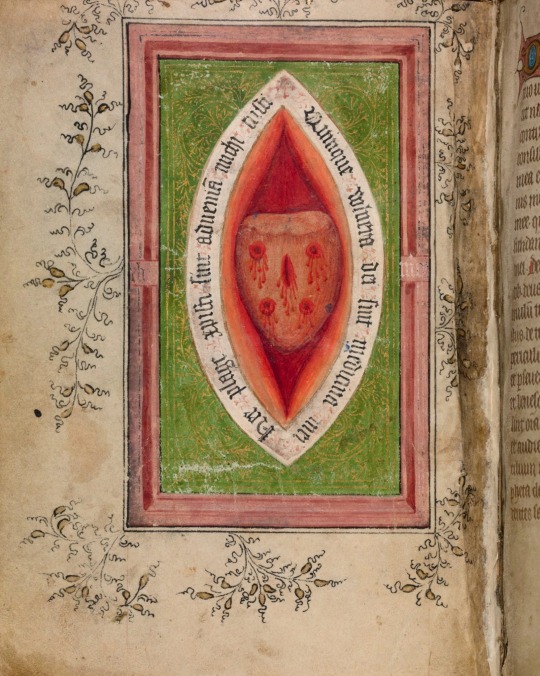
I am by far not the only or first:
“ -this tradition reflects the mystical notion that the body of Jesus is “the body of all bodies” and that it therefore encompasses both traditionally masculine and feminine characteristics.
…
I can understand how, to people who aren’t historians of medieval religion or art, the suggestion that medieval Christians in western Europe frequently imagined and depicted Jesus’s side wound as looking like a vulva might sound bizarre and ridiculous. Nonetheless, this is something that they incontrovertibly did. To understand why they did this, we must first take a look at their historical and cultural context.
The Gospel of John 19:32–37 describes Jesus’s side wound as follows, as translated in the New Revised Standard Version Updated Edition (NRSVUE):
Then the soldiers came and broke the legs of the first and of the other who had been crucified with him. But when they came to Jesus and saw that he was already dead, they did not break his legs. Instead, one of the soldiers pierced his side with a spear, and at once blood and water came out. (He who saw this has testified so that you also may believe. His testimony is true, and he knows that he tells the truth, so that you also may continue to believe.) These things occurred so that the scripture might be fulfilled, ‘None of his bones shall be broken.’ And again another passage of scripture says, ‘They will look on the one whom they have pierced.’
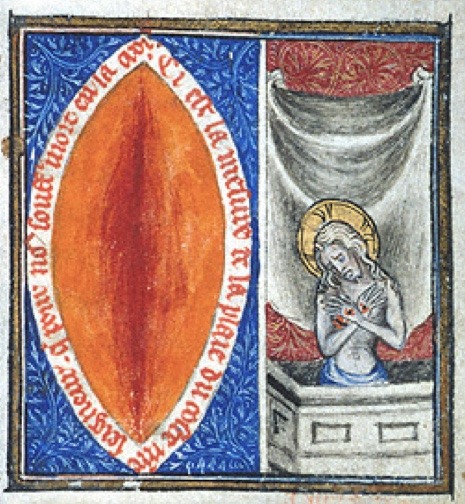
It is not very difficult to see how medieval Christians might have perceived an opening in a person’s body that bleeds, secretes a clear liquid, and is penetrated as in some sense analogous to a vagina—especially when you consider the fact the Latin word vulnus, meaning “wound,” sounds very similar phonetically to the word vulva, meaning “vagina.”
On top of all this, in the twelfth and thirteenth centuries CE, the metaphorical idea of Jesus as a mother became extremely popular and influential among western European Christians, especially among those who were more mystically inclined. Female mystic writers seem to have found this idea particularly appealing.”
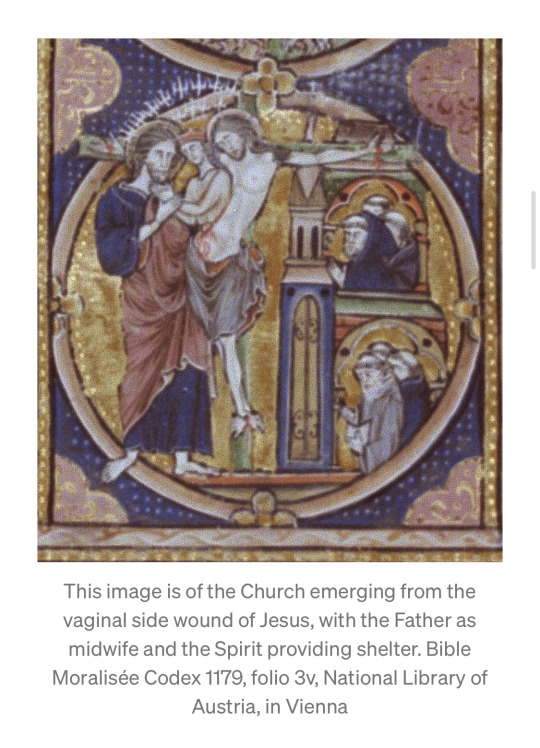
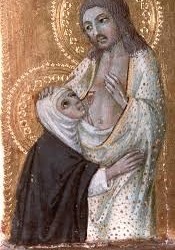
#side wound#christian mysticism#folk catholicism#christian witch#goddess art#holy mother of god#trans masc#medieval art#illuminated manuscript#jesus freak#queer artist#art history
62 notes
·
View notes
Note
it's māori language week here in aotearoa, and I discovered that there does exist a te reo māori translation of the Quran, but after doing some digging I found it was produced by an Ahmadiyya org, which I'd heard from various muslim friends as being not islam at all, or somewhat analogous to mormonism's relation to christianity.
I'd been somewhat interested in getting a copy, but knowing about it being produced by an ahmadiyya org, I'm unsure as to whether I should bother getting it, lest they have some specific interpretations that discolour the meaning of the original text; would it be wise of me to avoid it?
The Ahmadiyyas are a movement within Sunni Islam, which means that their transliterations of the Qur'an are just as valid as any other Qur'an. We all share the same unchanged text. The only difference is in HOW we interpret Scripture. However, they're a persecuted religious group and a lot of Muslims will excommunicate them, so there is gonna be a bias against them. I have personally never read their transliteration of the Qur'an, but since they follow the Hanafi school of thought, I'd assume their transliteration is fundamentally similar to the Sunnis with some of their own theology. Anyways, comparing them to the LDS is not correct, since the Ahmadis are not part of a cult and is just considered a revivalist/reformist movement that follow Sunni Islam in terms of fiqh (jurisprudence) and aqeedah (theology)
You do what you wanna do. Personally, as a Shi'a, any transliteration of Qur'an is valid, however, the way we extrapolate the esoteric and exoteric meaning from the verses differ fundamentally, which means that I wouldn't rely on any non-Shi'i interpretation of scripture for obvious reasons.
69 notes
·
View notes
Text
For Writers: Incorporating Esotericism into World-Building
Esotericism refers to a broad category of spiritual, philosophical, and mystical traditions that focus on the pursuit of hidden, inner knowledge that is only accessible to a select few.
In this first post, I'll introduce the basics of esotericism and explore how these concepts work together to create an ongoing cycle of birth, death, and rebirth. We'll also set the stage for exploring these ideas more deeply across different cultures and spiritual traditions.
It is about seeking the deeper truths of the universe, reality, and the self—truths that are often concealed from ordinary perception or common understanding. Esoteric teachings often require initiation, self-discovery, and a certain level of spiritual or intellectual maturity to grasp.
Esoteric traditions typically stand in contrast to exoteric religions, which are the outward, public practices of faith meant for all adherents. While exoteric traditions focus on communal worship, rituals, and scriptures available to everyone, esotericism emphasizes personal, internal experiences and insights, often hidden in symbolism, allegory, or mystical practice.
Esotericism offers a wealth of material for creating complex worlds and characters. Here are a few ways to use esoteric concepts in your writing:
Secret Societies and Mystery Schools: Create organizations in your world that guard hidden knowledge, initiate members into mystical traditions, and use symbols to communicate deep truths. These groups might influence politics, religion, or culture from behind the scenes.
Alchemical Symbolism: Use alchemical symbols and the concept of spiritual transformation to enrich your magic systems or character development. Characters could embark on a metaphorical "great work," transforming themselves spiritually as they pursue physical goals.
Correspondence and Cosmic Connection: Play with the idea of correspondence, where events in one realm reflect events in another. Perhaps the movements of stars dictate the rise and fall of empires, or characters must learn to read cosmic signs to guide their journeys.
Mystical Experiences: Characters could undergo mystical experiences that reveal hidden knowledge or spiritual truths. These visions might guide them on their quests or challenge their understanding of reality.
Key Concepts in Esotericism
Hidden Knowledge (Occult Knowledge) At the heart of esotericism is the belief that hidden truths—often called occult knowledge—exist beneath the surface of everyday experience. This knowledge is believed to offer a deeper understanding of the cosmos, the divine, and the human soul. In many esoteric traditions, discovering this hidden knowledge requires initiation, meditation, or the study of sacred texts. Occult, from the Latin word occultus (meaning "hidden" or "secret"), often refers to knowledge or power that is beyond ordinary human understanding, reserved for those who are spiritually or intellectually prepared to access it.
Initiation and Secrecy Esoteric knowledge is often protected by initiation rites and secrecy. Only those deemed worthy or prepared are allowed to receive the teachings. These secret societies or schools of thought, such as the Freemasons, Rosicrucians, and Hermeticists, practice initiation rituals to induct new members into the more profound mysteries. This is why esotericism is often linked with mystery schools—institutions that taught spiritual and philosophical ideas in secret, using symbolism, ritual, and hidden meaning to communicate their teachings to those ready to understand them.
Correspondence and Analogy One of the guiding principles of esotericism is the idea of correspondence, the belief that everything in the universe is connected and that the microcosm reflects the macrocosm. This is best summarized in the Hermetic maxim: "As above, so below." This idea suggests that everything on the physical plane reflects a higher, spiritual reality, and by understanding one level of existence, we can gain insight into the others. For example, the movements of the planets (macrocosm) can correspond to events in an individual’s life (microcosm).
Alchemy and Transformation Alchemy is one of the most famous esoteric traditions, often misunderstood as simply the quest to turn base metals into gold. In reality, alchemy is a complex system of symbolic and spiritual transformation. The actual "gold" of alchemy is the purification and elevation of the soul. The alchemist seeks material and spiritual perfection through transmutation—breaking down impurities and refining elements. Esoteric alchemy draws on the idea of transforming the self through spiritual growth, much as the alchemist refines metals in the laboratory. This process of personal transformation is a central theme in many esoteric teachings
Astrology and Cosmic Influence Astrology plays a significant role in many esoteric systems, as it is believed that the planets and stars influence not only events on Earth but also the individual soul’s journey. In esoteric thought, astrology is not merely a tool for divination but a system for understanding how the universe influences human experience and consciousness. Esoteric astrology emphasizes the spiritual and psychological meanings behind planetary movements, helping individuals understand their soul's evolution and the lessons they are meant to learn in each incarnation.
Mystical Experience and Direct Revelation Unlike dogmatic religious systems that rely on external authorities (like sacred texts or clergy), esotericism often emphasizes personal mystical experience. The goal is to achieve gnosis, or direct knowledge of the divine, through contemplation, meditation, or other spiritual practices. Mystical experiences in esotericism are seen as moments of direct communion with the divine, allowing the individual to transcend the limitations of ordinary perception and access more profound truths about the nature of reality.
In the next post, we’ll delve into how different spiritual traditions worldwide interpret culture, from Hinduism and Buddhism to Western esoteric traditions like Gnosticism and Theosophy.
Esotericism as a Path to Hidden Truths
Esotericism invites both readers and characters to explore the hidden layers of existence, seeking deeper meaning in the universe and within themselves. Whether through the study of ancient symbols, the pursuit of personal transformation, or the unveiling of cosmic connections, esotericism offers a profound and mystical journey into the unknown.
For writers, it provides a rich framework for crafting stories that explore themystical, the hidden, and the transformative. Whether you’re designing secret societies, crafting magical systems, or delving into character development through spiritual awakening, esoteric concepts can give your narratives depth, intrigue, and a sense of the transcendent.
Esotericism teaches that reality is more than what we see, and by peeling back the layers, both characters and readers can discover truths that are often hidden in plain sight.
#esotericism#world building#writer tips#writer community#writers on tumblr#writerscommunity#writersblr#writeblr#writer#creative writing#queer writers#writing#occultism#mysticism#esoterica#occult#alchemy#spiritual journey#shadow work#symbolism#astrology
37 notes
·
View notes